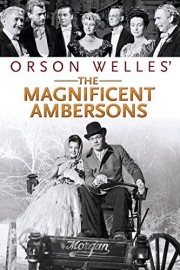The Magnificent Ambersons
With a career spanning from an uncompromised masterpiece his first time out (“Citizen Kane”) through several films that have been compromised by various production travails over the years (“Touch of Evil,” “Chimes at Midnight,” “The Trial”), it would seem odd to say that it was his first film after “Kane,” his adaptation of Booth Tarkington’s The Magnificent Ambersons, that ended up the most compromised work in Orson Welles’s career, but when you really get back to brass tax, it’s not hard to come to that conclusion. Even in it’s compromised form, it’s stature is not far below that of “Kane,” being one of only two films in Welles’s career to be nominated for the Best Picture Oscar, but at the same time, while “Touch of Evil” managed to be restored to much of the great director’s vision in 1998, and “The Trial” and “Chimes at Midnight” are completed works (although they were struggles to get that way), “Ambersons” can never be returned to the vision Welles had for the film, after 40 minutes of the film was cut (and subsequently destroyed), with no other copies of his original 135-minute film known to exist. The loss of those 40 minutes is one of the great tragedies of cinema, although editor Robert Wise (who directed some of the reshoots in Welles’s absence) said that the original version was no better. Alas, audiences will never be able to come to that conclusion for themselves.
Rather than focus on what “Ambersons” isn’t, however, it’s important for me, as a critic, to focus on what it is. In it’s shortened form, “Ambersons” remains a compelling family drama about a young man who is the heir to a respected family name, but who has been spoiled his entire life, and shows himself to be an entitled brat, even after having been away at school. As the narration by Welles says, the people in the town (Indianapolis in the early 20th Century) were hoping to find that George Amberson Minafer (Tim Holt), who got his last name from his father, whom his mother Isabel (Dolores Costello) married as a “safe” choice rather than following her heart to Eugene Morgan (Joseph Cotten), had gotten his comeuppance by the time he returned home on a school break. That would take many more years, however, after which his father would die, opening the door for potential romance between Isabel and the widowed Eugene, now a successful automobile plant owner, but George is a stubborn one, and cannot accept Eugene even before finding out that indeed, he was always the love of his mother’s life. He tries to keep them from one another, which also alienates him from Eugene’s daughter, Lucy (Anne Baxter), whom he has had interactions with that could lead to romance.
Although the film is well-acted and directed, even if the upbeat ending appears to stray from Welles’s original vision, it’s also a film that feels neutered compared to many of Welles’s other films, and not just because of the cuts made by RKO. Even if the 88-minute cut that exists now represented Welles’s ideas for the story, the film lacks the technical and narrative innovation we see in films like “Kane” and “Touch of Evil” and “The Trial.” Yes, it’s a downbeat film, and was before the studio cut it down, but that’s hardly a challenge to filmmaking convention compared to the cross-cutting and deep focus and sound innovations Welles’s played with in many of his other famous films. I didn’t even mention the sad tale of Fanny Minafer (Agnes Morehead), George’s aunt, who was also in love with Eugene, but was always a distant second to Isabel, and descends into emotional turmoil as she grows to be a spinster in old age, but depressing stories were a part of cinema before Welles made “Ambersons,” and his focus on the sadness at the heart of “Ambersons” feels in keeping with what he did in “Citizen Kane,” which is admittedly a very entertaining film, but also a very sad story. When one really starts to look at “Ambersons,” and figure out where it has a place in Welles’s career, is when one really laments being unable to see his original film, regardless of whether Wise is right about it compared to this one or not. Would that 40 minutes had made the film more profound, a more fitting follow-up to “Kane?” Would we have seen some of the technical magic that Welles was so famous for come through, rather than being left with a straightforward narrative that requires narration to tell it’s story, and if not, would it have mattered? Unfortunately, we will probably never get the answers to those questions, which do a disservice to “The Magnificent Ambersons,” because we shouldn’t have to wonder what might have been when a great director makes a film, and simply appreciate what we have in front of us. Unfortunately, in the case of this film, what’s in front of us fails to engage quite as powerfully as it might have had Welles not had the film taken away from him.










